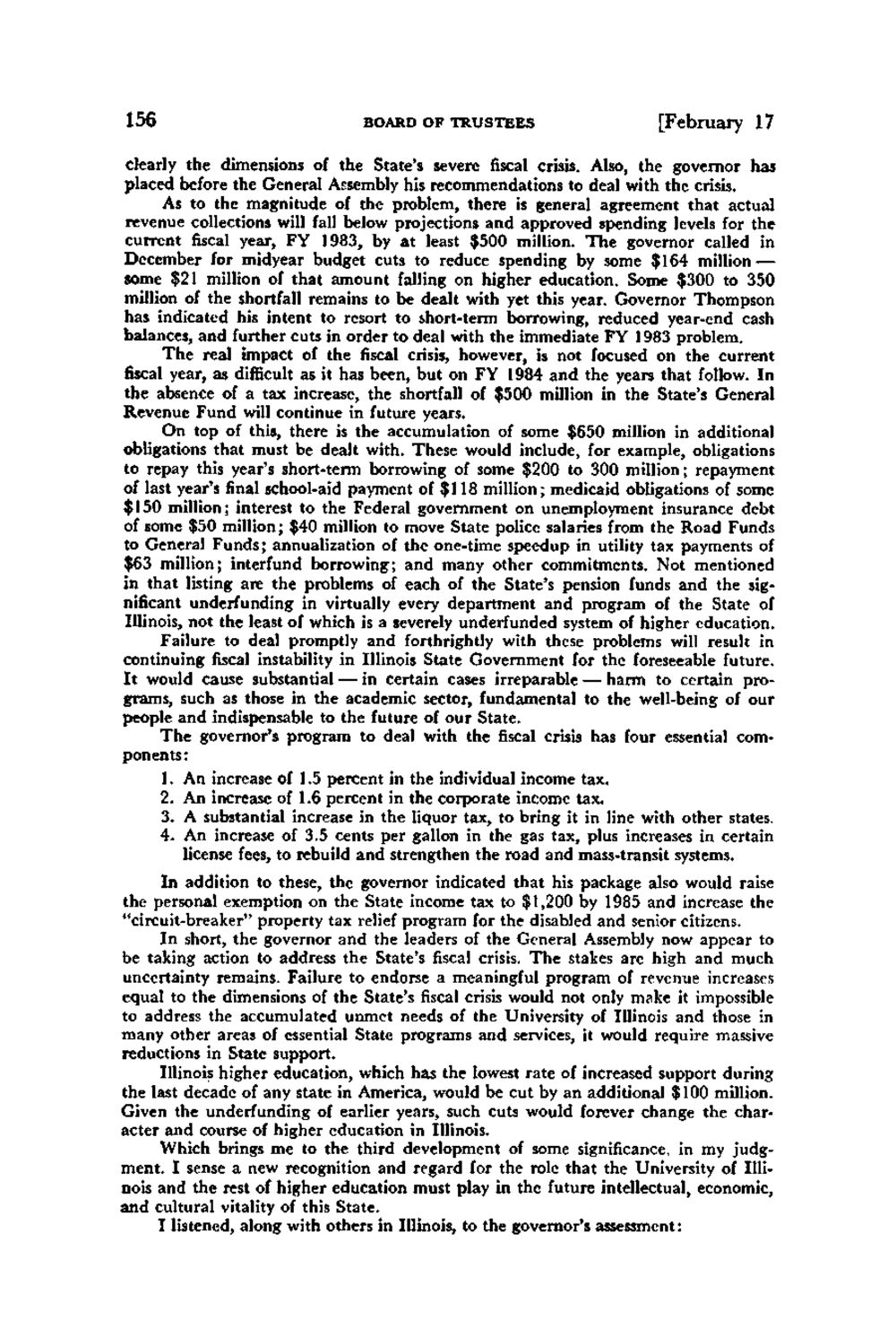| |
| |
Caption: Board of Trustees Minutes - 1984
This is a reduced-resolution page image for fast online browsing.

EXTRACTED TEXT FROM PAGE:
156 BOARD O F TRUSTEES [February 17 clearly the dimensions of the State's severe fiscal crisis. Also, the governor has placed before the General Assembly his recommendations to deal with the crisis. As to the magnitude of the problem, there is general agreement that actual revenue collections will fall below projections and approved spending levels for the current fiscal year, FY 1983, by at least $500 million. T h e governor called in December for midyear budget cuts to reduce spending by some $164 million — some $21 million of that amount falling on higher education. Some $300 to 350 million of the shortfall remains to be dealt with yet this year. Governor Thompson has indicated his intent to resort to short-term borrowing, reduced year-end cash balances, and further cuts in order to deal with the immediate FY 1983 problem. T h e real impact of the fiscal crisis, however, is not focused on the current fiscal year, as difficult as it has been, but on FY 1984 and the years that follow. In the absence of a tax increase, the shortfall of $500 million in the State's General Revenue Fund will continue in future years. On top of this, there is the accumulation of some $650 million in additional obligations that must be dealt with. These would include, for example, obligations to repay this year's short-term borrowing of some $200 to 300 million; repayment of last year's final school-aid payment of $118 million; medicaid obligations of some $150 million; interest to the Federal government on unemployment insurance debt of some $50 million; $40 million to move State police salaries from the Road Funds to General Funds; annualization of the one-time speedup in utility tax payments of $63 million; interfund borrowing; and many other commitments. Not mentioned in that listing are the problems of each of the State's pension funds and the significant underfunding in virtually every department and program of the State of Illinois, not the least of which is a severely underfunded system of higher education. Failure to deal promptly and forthrightly with these problems will result in continuing fiscal instability in Illinois State Government for the foreseeable future. It would cause substantial — in certain cases irreparable — harm to certain programs, such as those in the academic sector, fundamental to the well-being of our people and indispensable to the future of our State. T h e governor's program to deal with the fiscal crisis has four essential components : 1. An increase of 1.5 percent in the individual income tax. 2. An increase of 1.6 percent in the corporate income tax. 3. A substantial increase in the liquor tax, to bring it in line with other states. 4. An increase of 3.5 cents per gallon in the gas tax, plus increases in certain license fees, to rebuild and strengthen the road and mass-transit systems. In addition to these, the governor indicated that his package also would raise the personal exemption on the State income tax to $1,200 by 1985 and increase the "circuit-breaker" property tax relief program for the disabled and senior citizens. In short, the governor and the leaders of the General Assembly now appear to be taking action to address the State's fiscal crisis. T h e stakes are high and much uncertainty remains. Failure to endorse a meaningful program of revenue increases equal to the dimensions of the State's fiscal crisis would not only make it impossible to address the accumulated unmet needs of the University of Illinois and those in many other areas of essential State programs and services, it would require massive reductions in State support. Illinois higher education, which has the lowest rate of increased support during the last decade of any state in America, would be cut by an additional $100 million. Given the underfunding of earlier years, such cuts would forever change the character and course of higher education in Illinois. Which brings me to the third development of some significance, in my judgment. I sense a new recognition and regard for the role that the University of Illinois and the rest of higher education must play in the future intellectual, economic, and cultural vitality of this State. I listened, along with others in Illinois, to the governor's assessment:
| |